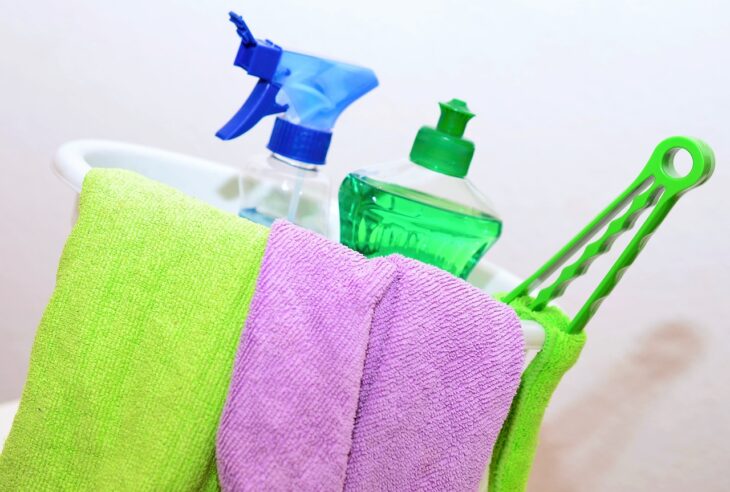
When you’re trying to conceive it’s important you avoid toxins. Sure, you know to stay away from the obvious like insecticides and crop dusters but what about the everyday products in your home? We are very much surrounded by poisons on a daily basis and may not even be aware of the potential risk. From flame retardants on your furniture to mercury in your fish, lead in some dishes and paint and even known endocrine disruptors and toxins in everyday items.
Most of the chemicals in your cleaning products and household items aren’t toxic enough to do any harm. And very often the amount you use is so minute the toxin is undetectable. No harm comes to your reproductive system or, if you’re already pregnant, the developing fetus. However, if your exposure is excessive and continual, your baby could be at risk for health problems at birth or in the future.
The Top Common Household Products to Avoid
In order to help you avoid exposure to certain chemicals that can disrupt your fertility, your pregnancy and future breastfeeding we’ve put together a list. Here are the top common household products to avoid when you’re trying to get pregnant.
- Laundry Detergent: Phthalates, used to make the smell of “clean” clothes last longer, are common in fragranced laundry detergent. This toxin is a known hormone disruptor and continued exposure may result in failure to ovulate. Other chemicals found in laundry soap may affect sperm production. You can avoid these issues when you use a natural, vegetable-based laundry soap that’s fragrance-free.
- Antibacterial Soap and Dishwashing Liquid: In these post-pandemic days we understand why most homes use antibacterial soaps and dish soaps religiously. Unfortunately, something much worse than catching a virus may happen. A known endocrine disruptor, triclosan, is one of the main ingredients found in antibacterial soaps. Triclosan interferes with hormone balance and sperm production as well. Switch to an all-natural soap for all concerned and be sure to look at the ingredients in all soaps and cleansers. Especially if they claim they are antibacterial.
- Varnishes, Stains and Paints: Lead isn’t so much a worry in paint and varnish products as it was decades ago, but paint products still carry toxins and toxic fumes. Glycol Ether affects both your menstrual cycle and your partner’s sperm production. If you’re trying to conceive and working on a big home project that involves paint. Stain or varnish please check to make sure the product you use does not contain glycol either. Or put off your project until your healthy baby arrives.
- Multi-Surface Cleaning Products: Products used on hard surfaces, mirrors and glass often contain a grease cutting component (typically listed as a “degreaser”) which impacts your fertility. The degreasers are solvent-based and know endocrine disruptors. Limit your exposure to multi-surface and glass cleaners with degreasers and if you do use them, wear gloves.
- Canned Foods and Plastic Containers: Not all, but many canned foods come in cans lined with a chemical called bisphenol A (BPA) which reduces the number of eggs in females of childbearing age as well as diminish sperm production. Look at the recycling information on the container (plastic and cans). If you see recycling number 3 or 7 do not use. And wash your hands thoroughly after touching these products.
- Retinoids: Yes, we’re all trying to hold back the hands of time. Unfortunately, you should absolutely avoid products containing retinoids while you’re trying to conceive and in pregnancy and breastfeeding too. Taken orally or as a topical anti-aging treatment, retinoids may cause problems with the growth of the developing fetus.
- Supplements: Never take any supplements not approved by your doctor. The FDA does not regulate supplements. They may contain substances that pose a risk to your reproductive system and developing fetus. Only take doctor-approved supplements and OTC medications.
- Hair Dyes: Many hair dyes contain toxins which may affect your menstrual cycle, among other things. If you have your hair professionally colored, ask your hairdresser if there is a vegetable-based alternative or hit pause on the hair color for a while. The skin of the scalp absorbs toxins in non-vegetable-based hair color.
- Acetone: A common chemical used in nail products acetone is very toxic especially when you’re trying to conceive. Thankfully the nail product folks are aware and now you can even have a professional mani-pedi without acetone products.
Avoid Toxins and Talk to Your Doctor
If you’re trying to conceive, please avoid these products. And if your work exposes you to harsh and toxic chemicals talk to your employer or ask your doctor for advice on mitigating your exposure. Please contact LA IVF for further concerns regarding your fertility.










